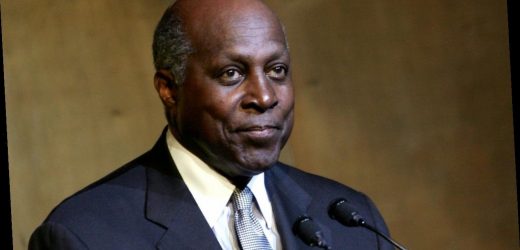Vernon Jordan, who rose from humble beginnings in the segregated South to become a champion of civil rights before reinventing himself as a Washington insider and corporate influencer, has died, according to a statement from his daughter. He was 85.
“My father passed away last night around 10p surrounded by loved ones his wife and daughter by his side,” his daughter, Vickee Jordan Adams, said in a statement to CBS News. “We appreciate everyone’s thoughtfulness and prayers.”
After stints as field secretary for the Georgia NAACP and executive director of the United Negro College Fund, he became head of the National Urban League, becoming the face of Black America’s modern struggle for jobs and justice for more than a decade. He was nearly killed by a racist’s bullet in 1980 before transitioning to business and politics.
His friendship with Bill Clinton took them both to the White House. Jordan was an unofficial Clinton aide, drawing him into controversy during the Monica Lewinsky scandal.
“The nation has lost one of its greatest champions of racial and economic justice,” National Urban League President and CEO Marc H. Morial said in a statement “He was a transformational leader who brought the movement into a new era. He was a personal mentor and dear friend. His passing leaves a tremendous void that can never be filled.”
The NAACP said Jordan’s “exemplary life will shine as a guiding light for all that seek truth and justice for all people.”
Jordan’s death comes months after the deaths of two other civil rights icons: U.S. Rep. John Lewis and C.T. Vivian.
After growing up in the Jim Crow South and living much of his life in a segregated America, Jordan took a strategic view of race issues.
“My view on all this business about race is never to get angry, no, but to get even,” Jordan said in a July 2000 New York Times interview. “You don’t take it out in anger; you take it out in achievement.”
Jordan was the first lawyer to head the Urban League, which had traditionally been led by social workers. Under Jordan’s leadership, the Urban League added 17 more chapters and its budget swelled to more than $100 million. The organization also broadened its focus to include voter registration drives and conflict resolution between Blacks and law enforcement.
He resigned from the Urban League in 1982 to become a partner at Akin, Gump, Strauss, Hauer and Feld.
Jordan was a key campaign adviser to Clinton during his first presidential campaign and co-chaired Clinton’s transition team. He was the first Black to be assigned such a role.
Clinton’s Health and Human Services director, Donna Shalala, called Jordan a great friend who was “larger than life.”
“A wise counselor, a patriot and generous citizen,” Shalala said Tuesday on Twitter. “His star will never be diminished.”
His friendship with Clinton, which began in the 1970s, evolved into a partnership and political alliance. He met Clinton as a young politician in Arkansas, and the two connected over their Southern roots and poor upbringings.
Although Jordan held held no official role in the Clinton White House, he was highly influential and had such labels as the “first friend.” He approached Colin Powell about becoming Secretary of State and encouraged Clinton to pass the NAFTA agreement in 1993. Jordan also secured a job at Revlon for Monica Lewinsky, a White House intern whose sexual encounters with the president spawned a scandal.
Jordan’s actions briefly drew the attention of federal prosecutors investigating Clinton’s actions, but he ultimately was not mentioned in a final report issued by special prosecutor Ken Starr.
Vernon Eulion Jordan Jr., was born in Atlanta on Aug. 15, 1935, the second of Vernon and Mary Belle Jordan’s three sons. Until Jordan was 13, the family lived in public housing. But he was exposed to Atlanta’s elite through his mother, who worked as a caterer for many of the city’s affluent citizens.
Jordan went to DePauw University in Indiana, where he was the only Black in his class and one of five at the college. Distinguishing himself through academics, oratory and athletics, he graduated in 1957 with a bachelor’s degree in political science and went on to attend Howard University School of Law in Washington. While there, he married his first wife, Shirley Yarbrough.
The young couple moved to Atlanta after Jordan earned his law degree in 1960, and Jordan became a clerk for civil rights attorney Donald Hollowell, who successfully represented two Black students – Hamilton Holmes and Charlayne Hunter – attempting to integrate the University of Georgia. In an iconic photograph, Jordan, an imposing 6 feet, 4 inches, is seen holding at bay the white mob that tried to block Hunter from starting her first day of classes.
In 1961, Jordan became Georgia field secretary for the National Association for the Advancement of Colored People. During his two years in the role, Jordan built new chapters, coordinated demonstrations and boycotted businesses that would not employ Blacks.
In a statement Tuesday, Georgia Democrat Stacey Abrams said Jordan “battled the demons of voter suppression and racial degradation, winning more than he lost.”
“He brought others w/him. And left a map so more could find their way,” Abrams said on Twitter. “Love to his family. Travel on with God’s grace.”
Jordan moved to Arkansas in 1964 and went into private practice. He also became director of the Voter Education Project of the Southern Regional Council. During his tenure, millions of new Blacks joined the voter rolls and hundreds of Blacks were elected in the South.
Jordan considered running for Georgia’s fifth congressional district seat in 1970, but was tapped that year to head the United Negro College Fund. Holding the position for just 12 months, Jordan used his fundraising skills to fill the organization’s coffers with $10 million to help students at historically Black colleges and universities.
In 1971, after the death of Whitney Young Jr., Jordan was named the fifth president of the National Urban League, which is dedicated to empowering African Americans to enter the economic and social mainstream.
“I believe that working with the Urban League, the NAACP, PUSH and SCLC is the highest form of service that you can perform for Black people,” Jordan said in a December 1980 interview in Ebony Magazine. “And if you serve Black people you serve the country as well. So if I do a good job here, the Black people are not the only beneficiary; so is the country. The country has a vested interest in Black people doing well.”
The high-profile position landed him in the crosshairs of a racist in May 1980 in Fort Wayne, Indiana. Jordan was shot with a hunter’s rifle outside his hotel after returning from dinner following a speaking engagement.
Jordan had five surgeries and was visited by President Jimmy Carter during his 3-month recovery in the hospital.
“I’m not afraid and I won’t quit,” Jordan told Ebony after the shooting.
Joseph Paul Franklin, an avowed white supremacist who targeted Blacks and Jews in a cross-country killing spree from 1977 to 1980, later admitted to shooting Jordan. He was never prosecuted in Jordan’s case, but was put to death in 2013 for another slaying in Missouri.
Jordan left the organization in 1981, but said his departure was not related to the shooting.
In 2000, Jordan joined the New York investment firm of Lazard Freres & Co. as a senior managing partner. The following year, he released an autobiography, “Vernon Can Read!: A Memoir.” Also in 2001, Jordan was awarded the Spingarn Medal, the highest honor given to a Black American for outstanding achievement.
He has received more than 55 honorary degrees, including ones from both of his alma maters and sat on several boards of directors.
— Originally published by CBS News.
Source: Read Full Article


